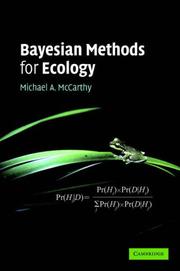| Listing 1 - 4 of 4 |
Sort by
|

ISBN: 9780521850575 0521850576 9780521615594 0521615593 9780511802454 9780511286445 0511286449 0511285701 9780511285707 0511802455 1107165091 1107086272 1280909641 9786610909643 0511284144 0511323085 0511284942 Year: 2007 Publisher: Cambridge Cambridge University Press
Abstract | Keywords | Export | Availability | Bookmark
 Loading...
Loading...Choose an application
- Reference Manager
- EndNote
- RefWorks (Direct export to RefWorks)
The interest in using Bayesian methods in ecology is increasing, however many ecologists have difficulty with conducting the required analyses. McCarthy bridges that gap, using a clear and accessible style. The text also incorporates case studies to demonstrate mark-recapture analysis, development of population models and the use of subjective judgement. The advantages of Bayesian methods, are also described here, for example, the incorporation of any relevant prior information and the ability to assess the evidence in favour of competing hypotheses. Free software is available as well as an accompanying web-site containing the data files and WinBUGS codes. Bayesian Methods for Ecology will appeal to academic researchers, upper undergraduate and graduate students of Ecology.
General ecology and biosociology --- Mathematical statistics --- Ecology --- Bayesian statistical decision theory. --- Research --- Statistical methods. --- Bayes' solution --- Bayesian analysis --- Statistical decision --- Balance of nature --- Biology --- Bionomics --- Ecological processes --- Ecological science --- Ecological sciences --- Environment --- Environmental biology --- Oecology --- Environmental sciences --- Population biology
Book
ISBN: 9781501708206 1501708201 9781501708190 1501708198 9780801454226 0801454220 9781501713170 1501713175 Year: 2017 Publisher: Ithaca, NY
Abstract | Keywords | Export | Availability | Bookmark
 Loading...
Loading...Choose an application
- Reference Manager
- EndNote
- RefWorks (Direct export to RefWorks)
Why has old-age security become less solidaristic and increasingly tied to risky capitalist markets? Drawing on rich archival data that covers more than fifty years of American history, Michael A. McCarthy argues that the critical driver was policymakers' reactions to capitalist crises and their political imperative to promote capitalist growth.Pension development has followed three paths of marketization in America since the New Deal, each distinct but converging: occupational pension plans were adopted as an alternative to real increases in Social Security benefits after World War II, private pension assets were then financialized and invested into the stock market, and, since the 1970s, traditional pension plans have come to be replaced with riskier 401(k) retirement plans. Comparing each episode of change, Dismantling Solidarity mounts a forceful challenge to common understandings of America’s private pension system and offers an alternative political economy of the welfare state. McCarthy weaves together a theoretical framework that helps to explain pension marketization with structural mechanisms that push policymakers to intervene to promote capitalist growth and avoid capitalist crises and contingent historical factors that both drive them to intervene in the particular ways they do and shape how their interventions bear on welfare change. By emphasizing the capitalist context in which policymaking occurs, McCarthy turns our attention to the structural factors that drive policy change. Dismantling Solidarity is both theoretically and historically detailed and superbly argued, urging the reader to reconsider how capitalism itself constrains policymaking. It will be of interest to sociologists, political scientists, historians, and those curious about the relationship between capitalism and democracy.
Pensions --- Pension trusts --- Industrial relations --- Compensation --- Pension plans --- Retirement pensions --- Superannuation --- Retirement income --- Annuities --- Social security individual investment accounts --- Vested benefits --- Political aspects --- Economic aspects --- History --- E-books --- Pensions - Political aspects - United States --- Pensions - Economic aspects - United States --- Pension trusts - United States --- Industrial relations - United States - History --- Etats-Unis
Book
Year: 2017 Publisher: Ithaca, NY : Cornell University Press,
Abstract | Keywords | Export | Availability | Bookmark
 Loading...
Loading...Choose an application
- Reference Manager
- EndNote
- RefWorks (Direct export to RefWorks)
Why has old-age security become less solidaristic and increasingly tied to risky capitalist markets? Drawing on rich archival data that covers more than fifty years of American history, Michael A. McCarthy argues that the critical driver was policymakers' reactions to capitalist crises and their political imperative to promote capitalist growth.Pension development has followed three paths of marketization in America since the New Deal, each distinct but converging: occupational pension plans were adopted as an alternative to real increases in Social Security benefits after World War II, private pension assets were then financialized and invested into the stock market, and, since the 1970s, traditional pension plans have come to be replaced with riskier 401(k) retirement plans. Comparing each episode of change, Dismantling Solidarity mounts a forceful challenge to common understandings of America's private pension system and offers an alternative political economy of the welfare state. McCarthy weaves together a theoretical framework that helps to explain pension marketization with structural mechanisms that push policymakers to intervene to promote capitalist growth and avoid capitalist crises and contingent historical factors that both drive them to intervene in the particular ways they do and shape how their interventions bear on welfare change. By emphasizing the capitalist context in which policymaking occurs, McCarthy turns our attention to the structural factors that drive policy change. Dismantling Solidarity is both theoretically and historically detailed and superbly argued, urging the reader to reconsider how capitalism itself constrains policymaking. It will be of interest to sociologists, political scientists, historians, and those curious about the relationship between capitalism and democracy.
Pensions --- Pension trusts --- Industrial relations --- Political aspects --- Economic aspects --- History.
Book
ISBN: 1839820225 1839820209 9781839820229 9781839820205 1839820217 9781839820212 Year: 2020 Publisher: Bingley
Abstract | Keywords | Export | Availability | Bookmark
 Loading...
Loading...Choose an application
- Reference Manager
- EndNote
- RefWorks (Direct export to RefWorks)
| Listing 1 - 4 of 4 |
Sort by
|

 Search
Search Feedback
Feedback About UniCat
About UniCat  Help
Help News
News